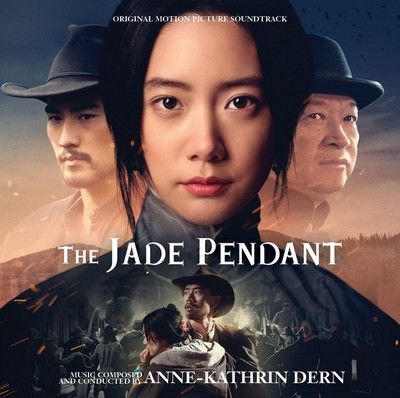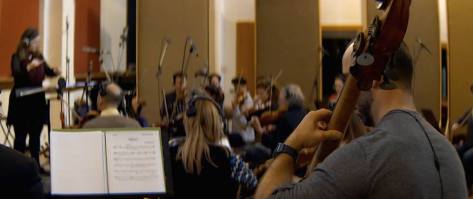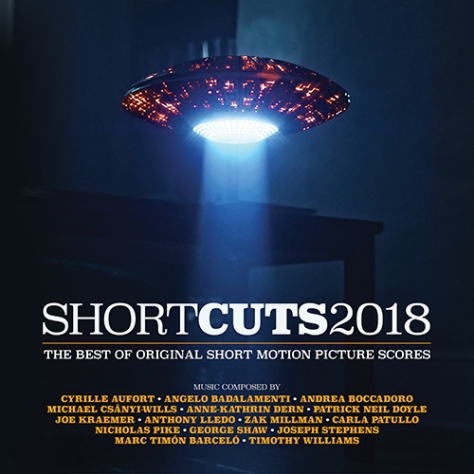
Can I begin by asking when did you decide that you wanted to write music for film etc?
Having grown up during the 90s with Alan Menken’s music for the Disney animations, I’ve always known that music and movies were my passion but I decided at around age 12 that I wanted to pursue it professionally. I had been playing various instruments and also got theory lessons but it wasn’t until I heard John Williams’ score for “Harry Potter and the Philosopher’s Stone” that I began to research the profession of a film composer. That same year, just a month later, Howard Shore’s “Lord of the Rings: The Fellowship of the Ring” came out and by that time I was completely taken by the idea of writing music for movies. It seemed like an unlikely thing to do at the time, with the film industry being on the other side of the world and without the internet as a resource completely out of reach as well. But I simply continued to study scores on my own, hoping that everything would fall into place eventually.

What musical studies did you undertake and whilst studying was there any one area of music or one instrument that you concentrated upon?
Early in my life, I mainly received private classical instrumental lessons (piano, vocals, flute) while also playing in a band regularly. After I graduated from high school, I attended a private school for a year called ‘musicube’ which at the time was the only private school in Germany that focused on film scoring. After that I moved to the Netherlands for four years to attend the film scoring program of the ArtEZ Conservatory. My main focus were composition and orchestration but I also took several minors that ended up being very important to me, including conducting and piano. After obtaining my Bachelor’s degree I moved to Los Angeles to finalize my studies at UCLA’s film scoring program which was a lot more hands-on and based on real life scenarios. I also furthered my studies later on during an internship at Hans Zimmer’s Remote Control Productions as well as ASCAP’s Film Scoring Workshop with Richard Bellis.

I recently reviewed your score for LILLY’S BEWITCHED CHRISTMAS which is a great score, how did you become involved on the project and what size orchestra did you use?
I became involved with this project through Klaus Badelt with whom I had been collaborating for a few years at that point. He had done the first two instalments of this movie series and generously introduced me to the production for the third. I’m not entirely sure what size orchestra we had on this since we recorded it back in summer 2017 at Galaxy Studios in Belgium. I do know that we had a full orchestra though with musicians from the Brussels Philharmonic, conducted by the wonderful Matt Dunkley. _
Both LILLY’S BEWITCHED CHRISTMAS and THE JADE PENDANT have been issued by Movie Score Media, do you have any involvement in what music from the scores is selected for the digital and then the CD release?

Yes, I make the selections and edits myself actually. Movie Score Media offers that service but since I’m more familiar with the material and the story, I tend to do this work myself. Sometimes I also like to remix cues for the soundtrack release which is a common practice. Movie Score Media then reviews my submission and suggests further edits or track orders. They also master the album and then take care of distribution and marketing.
What composers or artists would you say have influenced or inspired you?
I would probably say the biggest influences have been John Williams and Alan Menken since I grew up on their music and studied their scores a lot. However, I also have a soft spot for classical music, especially late Renaissance, late Classicism, and Romanticism. When it comes to popular music, my taste pretty much changes every year so it would be hard to name a specific group or artist there.

Do you think it is important for a composer to orchestrate and also conduct their own film scores, or at times is this just not possible?
In most cases this is impossible due to scheduling or lack of physical presence in the recording location. For orchestration it depends on how we define that job. Most composers give out fully detailed sketches or completely finished orchestral mock ups. So the “orchestration” is technically already part of the composition. However, someone needs to sit down and notate the music, make it playable, fix mistakes, foresee and solve problems before the sheet music hits the stands etc. – that is the job of the orchestrator. Any film composer who gets a movie with orchestral live recording will inevitably have an orchestrator (or even a team of orchestrators) because there would not be enough time to compose and notate hours of music in time for the recording sessions. Aside from that it’s always good to have someone with a fresh perspective writing down the sheet music. As far as conducting goes, I prefer to do it myself but this is by no means a requirement for any film composer. First off, a lot of composers prefer to be in the booth and hear is actually coming out of the speakers since it can sound vastly different from what’s happening in the live room. So whenever a composer conducts, they need to have someone they trust in the booth to make sure everything sounds as intended. Secondly, very often a production may not have the means to fly the team to the recording location in which case someone else needs to conduct the sessions while the creative team listens in remotely to give notes.
Themes that open movies nowadays seem to be becoming less frequently used. What is your opinion on this practise?

Anyone who has heard my music knows immediately that I love melodic writing. However, every project has different musical demands and other composers might prefer textures over themes. This is a different approach but not less legitimate than the traditional thematic scoring. It all depends on the director’s / producer’s vision, personal tastes, and what the story might need. THE JADE PENDANT is a varied and entertaining score even away from the images on screen. Did the director have any specific instructions regarding the style of music for the movie? On this movie I actually collaborated much closer with one of the producers, Straw Weisman. He was the one to bring me into the project after I had scored the trailer for the movie. We both agreed that this movie needed a traditional thematic score with Americana influences as well as Chinese colours to represent the cultural clash that happens in the story.

When scoring a short do you approach it in a different way from when you are working on a feature film. Likewise how does working on a TV series differ from scoring a feature?
From a technical standpoint it doesn’t differ too much. On a short film, I need to get to the point and make a statement much quicker with my music. There isn’t much room for thematic developments and the likes so ideas need to be presented in a clear and concise way. On TV shows there is obviously a lot more room for thematic development since one has a much longer runtime to make a statement, with several hours of music to be written over longer periods of time. However, TV schedules are as serious as movie schedules, and usually with an episode a week to be written there isn’t much time to think. Generally TV scheduling tends to be a bit crazy so a lot of writers are needed and the turnaround time is incredibly quick. On movies while still often very tight on time it’s less stressful with the amount of music to be written per week being lower.

How long is it before you begin to getting any fixed ideas for a movie after seeing the film?
I usually take about a week to ten days for research and – what Richard Bellis calls – ‘percolation’… letting the ideas sit and sink in. Some composers mistake this as procrastination but it’s actually a natural creative filtering process: You do research and put a lot of ideas into your brain, then you wait until the useful ones are filtered through. Once I know the sound and techniques I’m going for, I start writing fixed ideas which is usually after a good week or so of research and filtering. And how do you work out your musical ideas, via traditional piano, manuscript or by way of more contemporary technical methods? Apart from a handful of composers, I don’t think many people enjoy the luxury of working the traditional way any more. Turnaround times are much too fast so in most cases I only have limited time at the piano or with my voice before I have to go into production mode and make the music audible for the film makers (and eventually my team). Very often I will even create a sketch directly in my DAW since I have created a setup for that.
I do write down idea snippets at the piano during the research and theme writing phase but the moment we get to scoring directly to picture there would not be time to do that (aside from it being highly inconvenient and pointless as well because I’d have to repeat all the work again in the computer anyway before I can send it to the client – there’s no time to do the work twice). Once we’re scoring to picture, my team also already has fully produced mock ups in audio and MIDI form that I created so all the thematic ideas and variations are already in the computer anyway from where we can access and re-arrange it. Going back to the traditional way would be more of a hindrance at that point since the music technology developers have enabled many work flow templates for film composers that are simply faster and more convenient.

Have you encountered the temp track on any movies you have been asked to score, if so do you think that this is a distracting or helpful tool?
Yes, almost every movie has a temp score, especially when there are test screenings. On rare occasions I was even brought on early to help with the temp music if there was no music editor. Personally, I don’t find it distracting as long as the production isn’t too attached to the temp score. It’s a great way to communicate with people who cannot speak in musical terms. With temp music, they can show me what instrumentation and sound they like, or what pacing and energy we are going for, which otherwise would be hard to communicate without common vocabulary between us.

You have your own music production company, is this also film score driven or do you cater for all genres of music?
Yes, my company e-Quality Music Productions is basically my studio for film scoring. With film scores being any genre though, I’d say we cater to all genres of music. However, the main focus is certainly on orchestral music at the moment.
You are known not only as a composer but also as a, score co-ordinator,pro tools synth-master preparation, technical score advisor, score programmer etc, can you tell us a little about these roles?

These are very classical assistant tasks that I used to do during my first years in Los Angeles. I was a full-time studio assistant twice and at other times I was a freelance assistant who was contracted in by different composer studios to perform project related tasks. These tasks usually involve tech work, admin work, session preparation, mix preparation, music editing, creating mock ups or arrangements, etc. It’s a good thing to learn under more experienced composers and be part of a team for a while in order to understand the work flow and group dynamics as well as the political and creative side of things. It definitely helps me now that I am a hiring composer myself with a growing team. _
TROUBLE is an animated feature due for release in 2019, how did you become involved on the movie, and will there be a soundtrack release?
I had been working with two of the producers of the movie – Robyn Klein and Danielle Sterling – before as part of Klaus Badelt’s team. While the score was done by Mychael Danna and Jessie Weiss, I was brought in to write an orchestral song arrangement for the title song “Back To Earth” written by Chris Braide whose songs I had already orchestrated on the animated movie “Leap!” (aka “Ballerina”) a few years earlier. I’m fairly certain there will be a soundtrack release since there are some high profile artists involved in the movie’s songs.

When scoring a movie and you feel that a certain sequence calls for a solo performance do you write the piece with a particular soloist in mind, and are there any orchestras that you prefer to work with?
Sometimes I will write for a particular soloist, especially when it comes to vocals. My go to voice is my friend and soprano extraordinaire Tineke Roseboom so a lot of my female solo passages are written with her voice and range in mind. Sometimes the people I collaborate with also have specific people they would like me to write for, especially when it comes to ethnic instruments. But most of the time we simply choose the principal of each section to play a solo part during the session. So far, I very much enjoyed working with the musicians of the London Metropolitan Orchestra, the London Symphony Orchestra, and the Brussels Philharmonic. They are highly professional people who create a fun and respectful environment while bringing the highest level of musicianship to my compositions. In my experience, their sight reading skills and overall sound are only rivalled by the studio musicians in Los Angeles but due to some unfortunate union contract situations I don’t get to record with them very often.